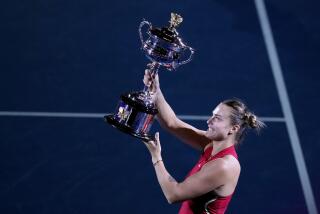Hewitt Stung by More Than Upset Loss
- Share via
MELBOURNE, Australia — Icing the Aussie turned into Spanish sport at the Australian Open. And by the time Alberto Martin stretched and slipped through the fine line of the rule book, he created history, making top-seeded Lleyton Hewitt of Australia vanish from the tournament.
Hewitt might as well have been a point guard, albeit a tiny one, standing at the free-throw line, suffering through a couple of timeouts by the opposing team with one second remaining. This, of course, is accepted and expected behavior in basketball.
Tennis used to be different. Martin’s timing was either amazingly coincidental or exceedingly calculating when he called for a three-minute injury timeout near the end of the fourth-set tiebreaker. Hewitt, set to serve, trailed, 4-5, and then had plenty of time to think about being two points from losing.
Which is what happened. Hewitt made consecutive groundstroke errors and Martin won, 1-6, 6-1, 6-4, 7-6 (4), making it the first time the Australian Open lost its No. 1-seeded player in the first round in the Open era.
Australian Davis Cup Coach Wally Masur used the word “dubious,” to describe Martin’s actions. Immediately after the loss, Hewitt accused Martin of gamesmanship. Hewitt also was realistic, knowing his fitness was not close to optimum level after he came down with chickenpox on Jan. 2.
“I think it’s a shocker what happened at 5-4,” Hewitt said. “He was really struggling at 4-4 when he was running around there and he had to come up with a huge forehand lob at 4-4 in the tiebreaker on his own serve.
“So you can read into it what you like, but you never know if I was going to get out of the situation, anyway. I still had to win that set and get out of the break and then win another set as well, but it would have definitely made my chances a lot easier, I think, if we had played fair.”
Martin denied any unfair play.
“I just don’t agree,” he said. “I think the rules are the rules, and he called the trainer, and maybe was having attention from the trainer. I had cramps. I called the trainer also. So it is the same thing.”
Not quite. Hewitt waited until a changeover to receive treatment in the fourth set. “It’s not the right thing to do at 30-30 in a game,” Hewitt said.
The rule can be manipulated. Previously, players could not be treated for cramps during a match, but the rule was changed in 1995, according to the ITF.
“Obviously, I don’t know how many referees and people we had sitting on the side of the court. There was at least three or four people who saw what happened out there, saw him play the whole tiebreak fine, and then come up with that,” Hewitt said. “Someone has got to put their [guts] on the line, one of the refs or somebody, otherwise people are going to take advantage of it, like he did today.”
This isn’t the first time a player has been questioned over the timing of medical treatment during a match at a Grand Slam. At Wimbledon in 2000, Jeff Tarango accused Paul Goldstein of faking an injury late in their second-round match, refusing to shake his hand after he lost. Goldstein, who received treatment on changeovers, said he did nothing unethical.
Already, trainers seem to have become a constant presence on the court. Players have been hit by a litany of injuries, including 13th-seeded Andy Roddick in his main-draw Australian Open debut against Mariano Zabaleta of Argentina. Roddick was wrong-footed in the second game of the fourth set and turned over on his ankle.
Roddick said adrenaline got him through the grueling 2-hour, 50-minute contest, winning, 6-3, 5-7, 6-3, 6-3. On the court, he told the trainer he was feeling twinges and was advised not to sit down too long on changeovers. Afterward, he received treatment on the ankle, electrical stimulation and ice, for almost an hour late today.
Ankle permitting, Roddick is scheduled to play Ivan Ljubicic of Croatia in the second round Thursday. Roddick tested the ankle in practice today.
There were mixed results for two other young Americans on the men’s side today in the second round. After winning the opening two sets, James Blake appeared to be running on empty in the fourth set against Stefan Koubek of Austria. He responded in what was a contentious fifth set but fell short as Koubek advanced, 4-6, 2-6, 6-4, 6-1, 6-2, in 2 hours 34 minutes
Wild-card entrant Taylor Dent of Newport Beach seems to be fine without a coach and reached the third round of a Grand Slam for the first time. He defeated No. 31-seeded Andreas Vinciguerra of Sweden, 6-3, 6-4, 6-2, in 1 hour 22 minutes and has not lost a set in two matches.
More to Read
Go beyond the scoreboard
Get the latest on L.A.'s teams in the daily Sports Report newsletter.
You may occasionally receive promotional content from the Los Angeles Times.











